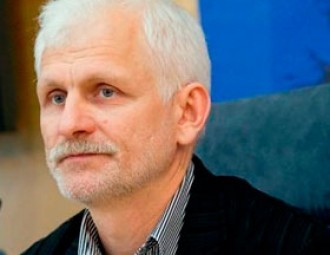Ales Bialiatski: Lukashenka’s regime is like a gun that hangs on the wall and can shoot at any time

On September 24 the meeting "Convincing violations of political, economic and social rights in Belarus" took place in Warsaw. Viasna and FIDH presented the report on human rights violations to OSCE.
The OSCE Human Dimension Meeting is held in Warsaw from 22 September to 3 October.
Belarusan human rights defenders – Ales Bialiatski, the president of the HRC "Viasna", former political prisoner; vice-president Valiantsin Stefanovich, and coordinator of the campaign "Human rights defenders against the death penalty" Andrej Paluda - presented review of the human rights situation in Belarus on September 24 in Warsaw.
“Because of the situation in Ukraine, as well as the deterioration of the human rights situation in Russia, we think that less attention is paid to Belarus " - charter97.org quotes the human rights defenders saying.
At the panel discussion were touched problems of preventive detentions of activists, violations of labor rights and compulsory labor in Belarus, as well as the problem of the death penalty, writes spring96.org. Valiantsin Stefanovich presented the report "Total violation of labor rights and compulsory labor in Belarus" and "Random preventive detention of activists in Belarus." He believes that there are no any system changes for the better in the country, the political situation is frozen, and the media situation has even deteriorated.
"Together with the problem of prosecution of the opposition, preventive detentions are the same problem and are exclusively based on the belonging of those who are detained, to one or another opposition structure. Preventive detentions are personalized, the police, without a doubt, know those who they delay. For example, we faced preventive detentions before and during the Ice Hockey World Championship. Not only representatives of opposition groups were preventive detained, but there was also held a campaign of "cleaning" the city of the so-called anti-social elements and prostitutes.
First preventive detentions have been used by the authorities on the eve of the election of the heads of opposition, before the 2006 election, 236 activists were arrested then. There are no grounds for such detentions and detainees are not provided with civil legal aid, and no information about their detention is given to their relatives. And the basis of the cases lies exclusively on the testimony of police officers, "- he said.
Human rights defenders also spoke about the problem of compulsory labor and the contract system that is used like a pressure on every person in the country. According to them, every Belarusian family has at least one person who faced with the problem of compulsory labor, or the problem of the non-renewal of short-term employment contracts in case of any problem connected with the demonstration of any form of protest, as well as in connection with any of the opposition structure. Also relatives of wageworkers appear under pressure: spouses lose their jobs and the children could not continue their studies.
There were examples of such forms of compulsory labor as litter pick, the compulsory internship of students, the work of so-called "obligated persons" and persons in Medical-Labour Centres.
"The death penalty is in a serious secrecy, and the state is shooting its citizens each year in the center of Minsk, in prison at Valadarskaha Street. We think that for the period of the sovereignty of Belarus were executed about 400 people, but we cannot say how many exactly because of this secrecy ", - says Andrej Paluda.
Ales Bialiatski said that the reports were prepared while he was in prison, and noted that the issue of the compulsory labor touched him personally in prison.
"My salary in May for a six-day working week for 7 hours per day was $ 3.5, of which $ 2.5 were deposited in the prison for heating, water and so on. With such a miserable salary, for example, “obligated persons” have a debt that is still growing, and with the debt they cannon not fall under the amnesty. It’s like a cycle, a desperate situation, "- said a former political prisoner.
Ales Bialiatski compares the Lukashenka regime with a gun, which hangs on the wall and can shoot at any time, and mentions the situation with the elections of 2010, when before them there also was a kind of a "thaw" in relations with the West, as it is now. He believes that the death penalty is "the main marker of the state of humanity," believes that the demand for the release of political prisoners should be a prerequisite for the Belarusian regime from the side of the international community, and preventive detentions before a World Cup Hockey are very disturbing signal on the eve of elections 2015.
"The situation with Ukraine extremely negative effects on the situation around Belarus, and it is important for us to continue to defend human rights in Belarus", - he said.
-
03.01
-
07.10
-
22.09
-
17.08
-
12.08
-
30.09



























